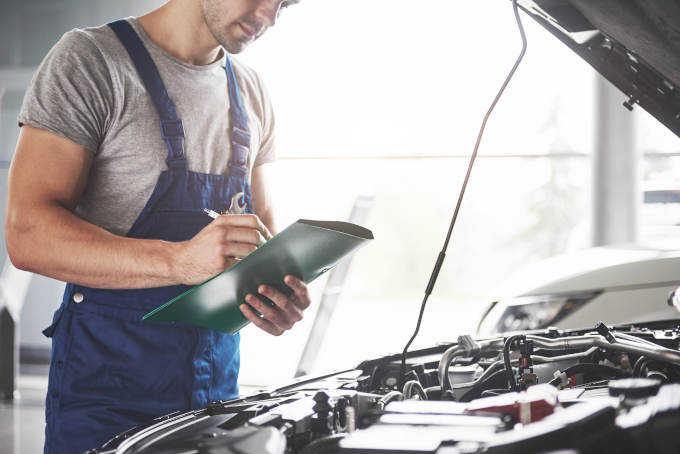One of the most essential pieces of equipment in your car is your transmission. Most vehicles manufactured today come with an automatic transmission — a highly complex and truly fascinating set of hydraulic gears, fluid, electro-mechanical valves, and pumps that ensure your vehicle has the ability to accelerate, decelerate, and switch between gears with ease.
With the advent of the automatic transmission, few drivers give much thought to what is going on under their car’s hood. They simply trust that their transmission will work each time they hop in the car and turn the ignition. However, like any other part of a vehicle, the transmission can wear down over time. Without proper care and maintenance, the transmission system can begin to slip, malfunction, or break down completely.
When your transmission fails, that may be the end of the road for your beloved vehicle. To ensure that you avoid a costly and potentially catastrophic failure, know the symptoms of transmission problems and the steps to troubleshoot problems when they arise.
Symptoms of Potential Transmission Problems
Fortunately, there are a variety of ways you may be able to tell if your transmission is having problems well before it’s too late. Wondering what the most common signs and symptoms of transmission issues are? Take a look at the following list, and see if any of them match up to your vehicle’s current problems:
- The vehicle is noisy while in neutral
- You can hear whining, humming, grinding, or clunking noises coming from the vehicle
- Unexpected shaking or rumbling while driving
- Gear shifts feel uneven, difficult, or won’t shift at all
- The gears slip when shifting or while accelerating or decelerating
- The transmission overheats
- The Transmission Warning Light or a Check Engine Light (CEL) appears on your dashboard.
Any of these symptoms may be the sign of potential transmission issues, as well as several other issues that may be related to various parts of your transmission system, such as the transmission fluid, the transmission pump, and the gears themselves.
Top Reasons for Transmission Failure
There are a variety of reasons that your transmission may be malfunctioning or failing. The moment that you begin to notice any of the above symptoms of transmission issues, it is vital that you seek the aid of a trained mechanic to help you identify the problem. Here are some of the top reasons for transmission failure and why you may be experiencing problems:
Low Transmission Fluid
The transmission in your vehicle operates through a fluid-driven hydraulic system that cools and lubricates vital components. Should that fluid begin to run low, you will likely notice any of the symptoms listed above. It is important to regularly check your transmission fluid to ensure that it is filled to the manufacturer-recommended level.
Contaminated Transmission Fluid & Clogged Transmission Filter
Just like engine oil, transmission fluid can become dirty and contaminated over time. As your vehicle’s transmission fluid ages and becomes dirty, the entire system’s performance may suffer. If the transmission filter becomes clogged from the contaminants in the fluid, you will also begin to see your transmission act up.
Failing or Faulty Transmission Pump
For your transmission to operate, the fluid must be pressurized by your transmission pump. Without a properly functioning transmission pump, your vehicle will not have the power to shift gears smoothly. Should the pump wear down or fail, you will quickly experience engine trouble, gear slippage, and noise from the engine block.
Transmission Solenoid Problem
As you drive, a computer in your vehicle analyzes data being sent to sensors in your engine and transmission. Using this information, the Engine Control Unit (ECU) or the Transmission Control Unit (TCM) executes the appropriate upshift / downshift by sending a signal to one of several shift solenoids located in your transmission. In time, a shift solenoid can fail due to electrical issues or dirty fluid that has caused it to become stuck open or closed. This in turn can cause serious problems such as erratic shifting, delayed shifting, or the inability to downshift.
The Clutches, Bands, or Torque Converter Wears Down
Fluids and pumps aren’t the only part of the transmission system. There are also clutches, bands, and a torque converter to help your transmission react and respond quickly as you shift gears. As with any other part of your transmission, these can also begin to wear down with repeated use. Should any of these small but essential parts wear down or fail, you will find your vehicle quickly losing the ability to shift gears and power itself forward.
Avoiding Transmission Failure
When it comes to taking care of your transmission, the best way to avoid problems is to plan and prepare for any potential issues.
Make sure that you always take your vehicle to a trained and qualified expert mechanic for routine maintenance. Be sure to follow your vehicle manufacturer’s maintenance schedule, which will include specific recommendations for transmission treatments. Always work with a transmission expert when having any work completed on the transmission system in your vehicle.
At the first sign of trouble, make sure to have your vehicle checked out by a mechanic. Keep the list above of potential transmission issue symptoms handy to know what to watch out for. This will ensure that you catch problems early — before they become expensive repair jobs.
Finally, practicing responsible driving habits is one of the best ways to care for your transmission and other vehicle systems. Avoid harsh shifting and abrupt accelerations or decelerations that can damage the gears. If you have a manual transmission, it is even more important to avoid improper gear shifting. Towing heavy loads and burnouts can also wreak havoc on your transmission.
Avoid Catastrophe With True Transmission Wisdom
Transmission issues are a leading reason drivers have to make difficult decisions between budget-busting repairs or purchasing a new vehicle. Without a properly functioning transmission, your vehicle will be dead in the water (or on the side of the road). By knowing the symptoms of potential transmission issues and the causes behind those noises, slips, or leaks, you can make sure that your vehicle stays healthy and on the road for years to come. Use your newfound wisdom to ensure that your transmission is well-maintained, and you will avoid having to face catastrophe while on the road.
We're Here to Help
AAMCO has more than 60 years of experience diagnosing, servicing, and repairing more than 20 million vehicles. Customers rely on us for:
- Quality workmanship
- Expert Technicians
- Superior service
- Best warranty coverage available
- Trustworthy, honest service
AAMCO Centers of Southern California and surrounding areas represent trust, quality, and value. Call us today!

 Schedule Appointment
Schedule Appointment















